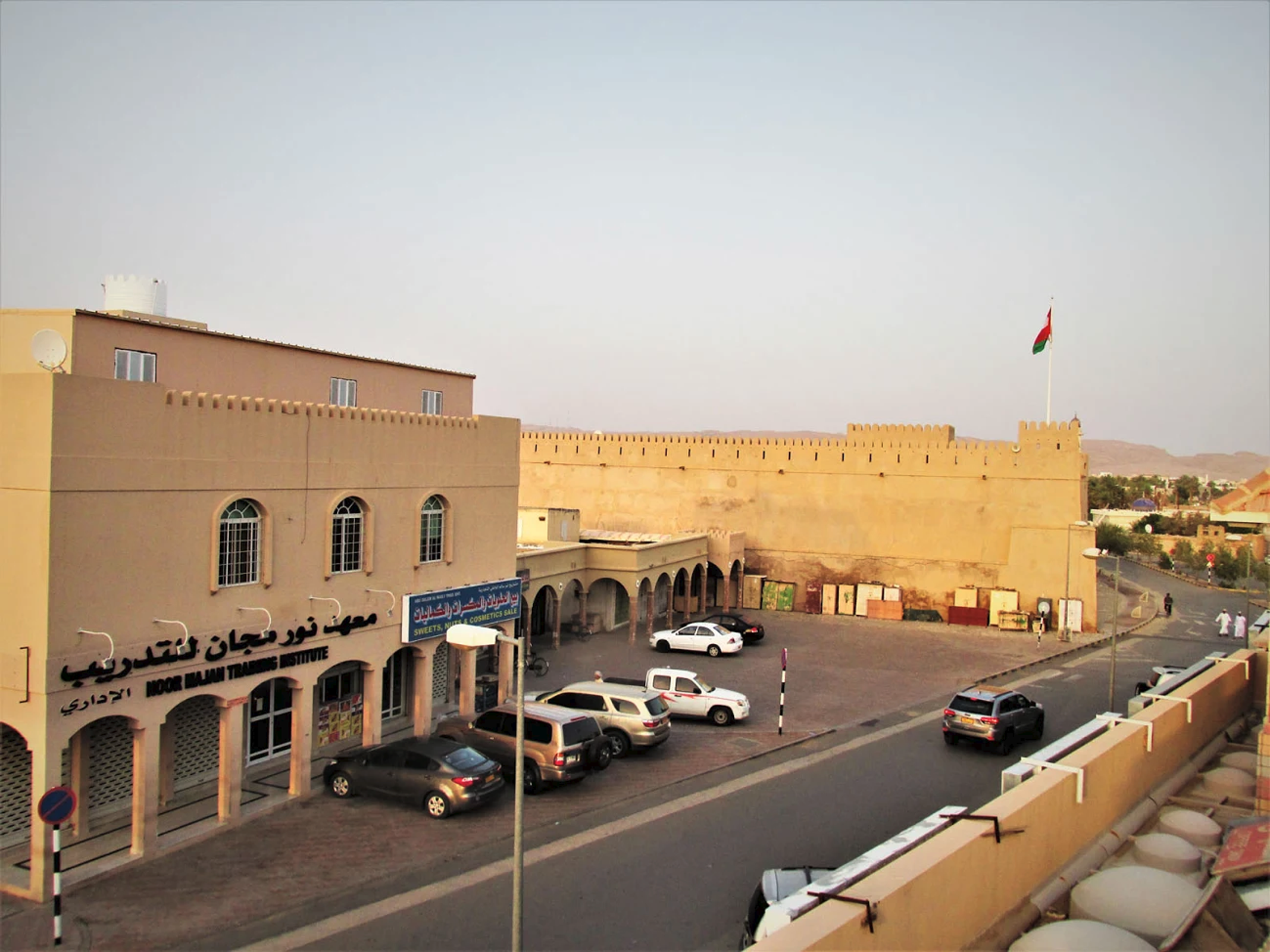Academic Program Overview
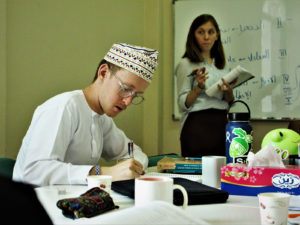 The intensive Arabic program is designed to rapidly develop a student’s language abilities by enabling them to engage with Arabic speakers confidently.
The intensive Arabic program is designed to rapidly develop a student’s language abilities by enabling them to engage with Arabic speakers confidently.
Noor Majan believes that successful language acquisition occurs, when students are repeatedly challenged to develop their listening, speaking, reading, and writing abilities in a structured environment. Thus, Noor Majan’s intensive Arabic program reflects this idea by developing all four language skills with a focus on three distinct concentrations; foundational knowledge in Modern Standard Arabic (MSA), skills development, and application of knowledge and through media literacy. The program will provide intensive reading, writing, speaking, and listening practice for 25 formal contact hours per week, lasting for a total of 4 weeks per term, a total of 100 formal contact hours per month. In addition to the 25 formal contact hours per week, Noor Majan’s intensive Arabic course strengthens students abilities with 2 hours of language partner sessions per week. During these language partner sessions, students will learn how to apply their classroom knowledge in a real-life setting, solidifying their knowledge.
Noor Majan uses authentic and genuine material from print and broadcast media from the internet. Students will acquire the competence to consume, understand and comment on news broadcasts, articles, excerpts and forum contributions using the adequate language register.Throughout the course, students will build on existing knowledge in Arabic grammar, vocabulary, pronunciation, spoken and written skill-sets. Finally, students will be introduced to various spoken dialects, enhancing their ability to understand the greater Arabic speaking world.
For information on our program dates and prices please see below.
Course Objectives
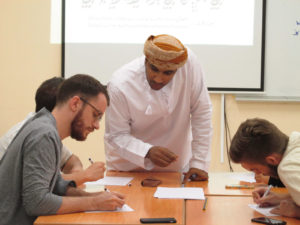
Objective 1: Grammar, Text production, and Discussion
Writing: Be introduced to new grammatical features that are part of a higher level of expression. Students will learn to construct sentences and express more complex thoughts independently. Students will be asked to produce texts departing from the texts treated in class. These include summaries, descriptions, narrations, and argumentative pieces developing a personal standpoint according to their level.
Speaking: Students will discuss current topics in class or in debate groups using the studied grammar features. They will have awareness raised concerning typical mistakes in sentence structure and pronunciation. The course is completed by oral presentations in class.
Objective 2: Media literacy
Listening: Students will develop the ability to comprehend utterances in the target language in recorded from broadcast media, in both Fuṣḥā (MSA) and commonly spoken Arabic as found in reports, interviews, and talk shows.
Reading: Students will be introduced to texts from print media and the internet using the grammatical structures under study. In this unit, students will read different genres of texts, learn and apply skimming techniques according to their level, understand in-depth the given texts, and analyze them grammatically and style-wise.
How We Evaluate Our Courses
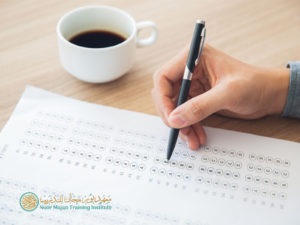
Students receive continuous feedback from instructors throughout the course. Evaluation is a reflection of the student’s proficiency, participation, engagement, and progress. Feedback is based on oral participation in class, results in quizzes, tests, and final exams as well as oral presentations in class and homework completion. Students can meet their teachers individually whenever they wish to discuss their performance and progress.
Noor Majan Grading Scale
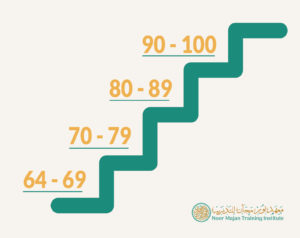
| Excellent | Very Good | Good | Pass |
|---|---|---|---|
| 94 – 100% = A | 87 – 89% = B+ | 77 – 79% = C+ | 67 – 69% = D |
| 90 – 93% = A- | 84 – 86% = B | 74 – 76% = C | 64 – 66% = D |
| 80 – 83% = B- | 70 – 73% = C- |
Course Material

The primary course book used by Noor Majan is Al-Kitaab fii ta’allum al-’Arabiyya by Brustad/Al-Battal (2nd edition); depending on whether you’re a complete beginner or an advanced student our curriculum is based on this internationally recognised resource, complemented with excerpts from other renowned sources, e.g. Al Kitab Al Asasi (El Seyyid Badawi), Modern Standard Arabic (Eckehard Schulz) or Ahlan wa Sahlan (Mahdi Alosh). For the media course, classes are based on real-time current and authentic resources from print and broadcast media in class.
Our methodology is to engage the mind with a relevant and appropriate usage of the language. Thus any opportunity to bring external sources and materials is exploited and very much encouraged by the Noor Majan methodology.
Although the material listed above is Noor Majan’s standard offering for Arabic courses; we can accommodate for an extensive set of curricula, dependent on your needs and requirements as an institute. Our institute and teachers are able and willing to deliver to your requirements. Please enquire for information regarding your requirements and curriculum.
Block 1 (Learning Outcomes (beginner))
At the end of the unit/program beginner students will be able to form short and simple sentences. Students will posses a good amount of basic vocabulary as used in familiar and everyday situations with a limited ability to use this vocabulary correctly grammatically in all related situations. They will be able to answer formulaic questions with only rare occurrences of mistakes in vocabulary and grammar. Students will start expressing their thoughts independently of formulaic expressions albeit their uttering may be incomplete or incorrect at times. Students will be able to understand the general content of speech on familiar topics, and will have developed a more accurate sense of differentiation between similar sounds of the Arabic alphabet for their own text production.
Learning Outcomes (advanced beginners)
At the end of the unit/program Advanced Beginner students will be able to express themselves about personal topics and issues relating to daily life in short sentences. Students will be able to express their needs, requirements and wishes (in a restaurant, hotel, taxi or shop) and speak about their hobbies. They will be able to answer non-formulaic questions to a certain extent and be in sometimes able to correct themselves while speaking or writing. Students will have more fluent reading ability and develop a better sense for Arabic written expression. Students will be able to understand the general content of speech, and will have developed a more accurate sense of differentiation between similar sounds of the Arabic alphabet.
Learning Outcomes (Intermediate)
At the end of the unit/program Intermediate students will be able to converse confidently about social issues. They can retell stories and speak about events that happened in the past. Students at this level will be able to express themselves about a variety of topics in all tenses. They can be understood by native speakers and partake in their conversations. Students will be able to understand and analyse Arabic grammar as used in diverse sources. Students will be able to use new grammar and vocabulary in order to produce coherent texts about social, historical, and personal topics.
Learning Outcomes (Advanced)
At the end of the unit/program Advanced students will be able to express their opinion supported by arguments and can coherently reply to other opinions being expressed. Students at this level will be able to speak and write about varied and complex topics and issues that do not pertain to their direct environment and life. They are able to understand abstract texts and speech and can express themselves on these topics intelligibly. They are able to process authentic text sources of the target language such as print and broadcast media, books and websites. They can independently develop on the issues raised in these source texts and organize written and oral texts on a formal language level.
Learning Outcomes (Higher Advanced)
At the end of the unit/program Higher Advanced students will be able to express their opinion supported by arguments and can coherently reply to other opinions being expressed. Students at this level will be able to speak and write about varied and complex topics and issues that do not pertain to their direct environment and life. They are able to understand abstract texts and speech and can express themselves on these topics intelligibly. They are able to process authentic text sources of the target language such as print and broadcast media, books and websites. They can independently develop on the issues raised in these source texts and organize written and oral texts on a formal language level.
Daily Schedule
| Start | Finish | |
|---|---|---|
| 8:30 | 10:10 | MSA Textbook work |
| 10:10 | 10:30 | Break |
| 10:30 | 11:20 | MSA Skills focus |
| 11:20 | 11:30 | Break |
| 11:30 | 01:10 | Media Arabic |
| 01:10 | 01:50 | Lunch |
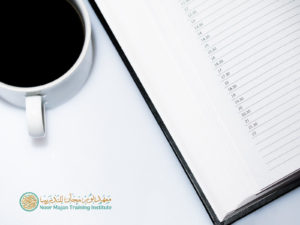 Language Partners
Language Partners
At Noor Majan we recognize that successful language acquisition comes from a repetitive application of concepts and knowledge in real life situations. Thus, to support language growth we pair students with local Omani language partners for two hours every week. These individuals are given training on intercultural communication and strategies on how to support students studying Arabic. They encourage students to speak Arabic freely and to be confident in their language abilities. More than often language partners become students’ friends and serve as a mentor in engaging in the local culture. Friendships between language partners often lead to students being invited to their homes or to family events.

